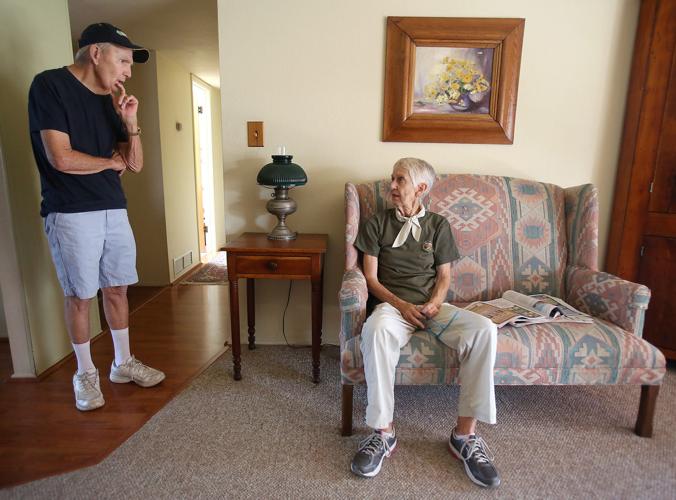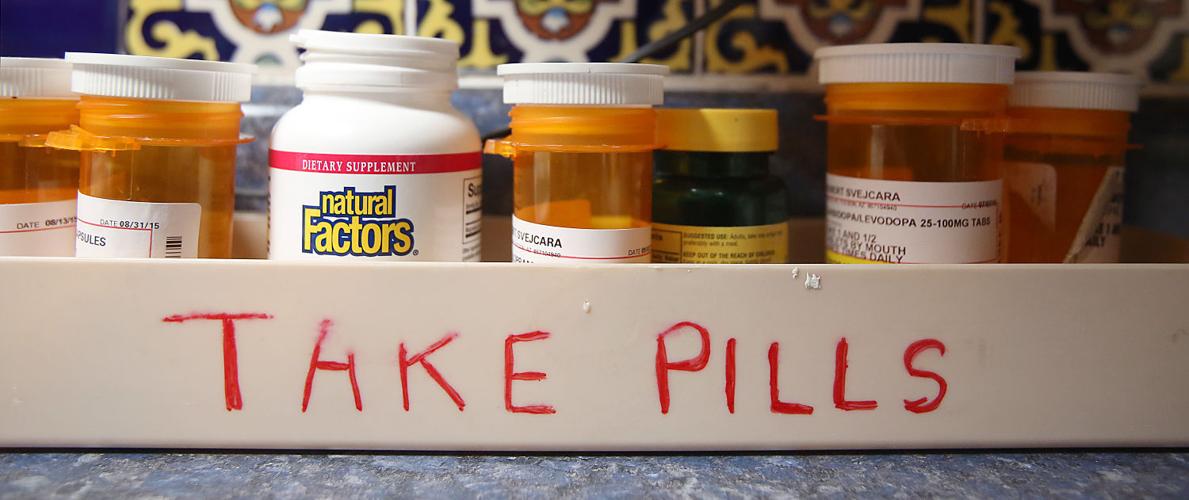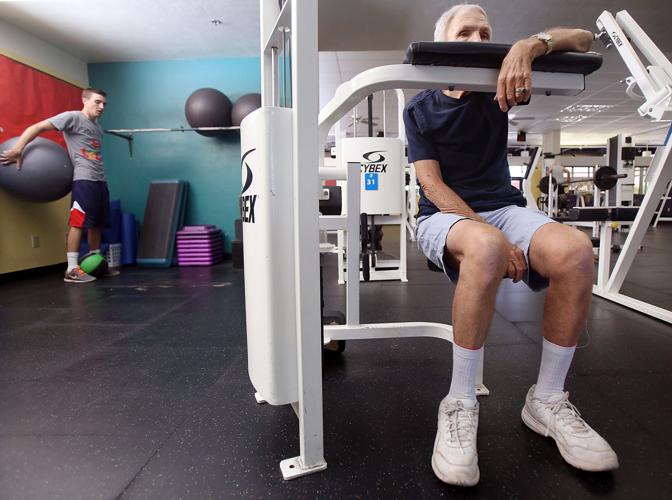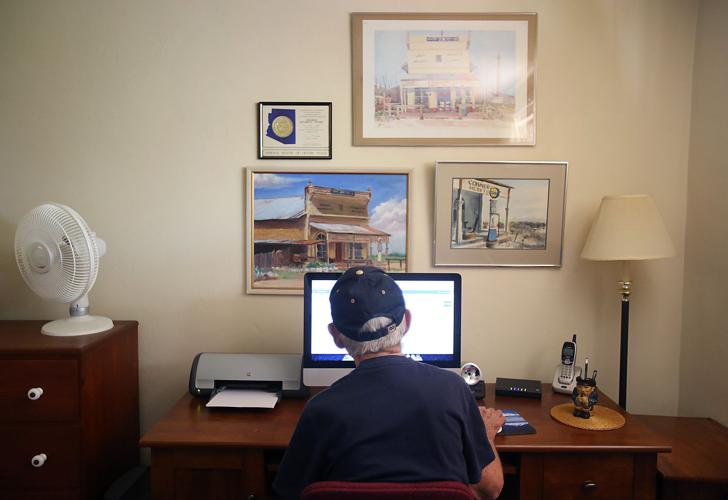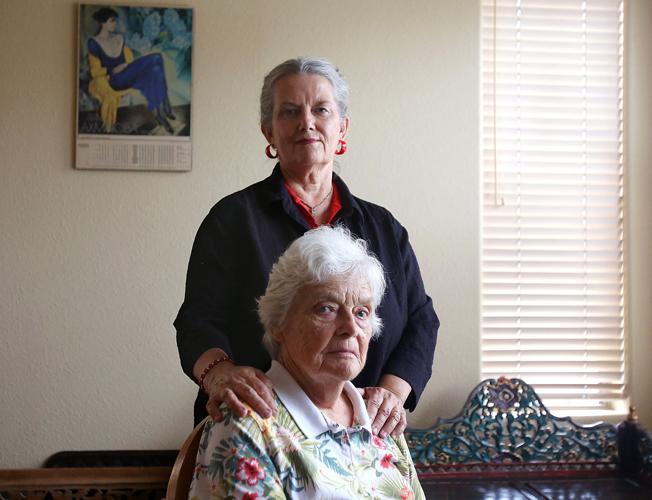On a road trip home from Colorado, Bob Svejcara — typically a lead foot — cruised down the highway at 20 mph.
It was the red flag his wife, Robin, couldn’t ignore.
“I thought, ‘Wow that’s strange, why is he driving that slow? There’s nobody on the road,’” Robin recalls. “He’s usually the one I’d tell to slow down.”
There were other signs something might be wrong — Bob once forgot how to get to Walmart and sometimes seemed confused and unsure of himself on hiking trips.
The end of that road trip marked the beginning of a different journey for the Svejcaras. Robin took Bob to get checked out and doctors diagnosed him with Alzheimer’s disease in April 2013.
Robin has done the driving ever since and has become Bob’s full-time caregiver.
FAMILY STEPS UP
When a loved one is diagnosed with dementia, family members usually step up as caregivers until it’s no longer possible.
In 2014, there were 314,000 unpaid caregivers giving 357 million hours of care to someone with Alzheimer’s disease in Arizona, says the Alzheimer’s Association. Pima County caregivers put in an estimated 89 million hours of unpaid care.
Putting in that many hours, caregivers tend to neglect themselves, says Kelly Raach, regional director of the Desert Southwest Chapter of the Alzheimer’s Association. In 2014, caregivers racked up health-care costs that were $155 million higher than those who were not caregivers.
“The instances of chronic disease in caregivers is high because they don’t go to the doctor or are unable to get away,” Raach says. “They shrug it off and keep going.”
But getting away and having a back-up plan is vital for health and peace of mind.
“It’s really important for people to ask for help and get respite care, even if it’s two or three hours a day, so you can go to a movie or get your hair done ... take care of yourself,” says Natalie Ireland, support group facilitator for the Alzheimer’s Association.
A DAY can FEEL
LIKE 36 HOURS
A day of caregiving can feel endless.
So much so, that a family guidebook was written on the subject and titled, “The 36-Hour Day.” Raach recommends the book to families who are in the trenches of caregiving.
Maria Gonzales, who is caring for her husband, Joe — who was diagnosed with both Alzheimer’s and Parkinson’s diseases earlier this year — says the days feel long because, “you’re going, going, going all the time.”
“Nothing in my life prepared me for this,” Gonzales says. “I used to teach and I had 29 children in my classroom, and I handled that fine. But this is an adult who has his own mind and his own ways and wants to do certain things like he used to, but he can’t, and I have to be dealing with that.”
Maria also cares for their 44-year-old son, Carlos, who has Down syndrome.
The family’s day starts at 6 a.m., to get Carlos ready for his day program. Once Sun Van picks him up between 7 and 7:40 a.m., Maria and Joe do the shopping, go to doctor’s appointments and get lunch before picking Carlos up. Then it’s time to rest and make dinner.
“Basically, I’m taking care of them most of the day,” Maria says.
One of the family bathrooms had to be set up so Joe could sit down and shower, which he can still do himself, with reminders from his wife.
“I’m not a person who says, ‘Oh I can do it all,’” Maria says. “I will do it as long as I can, but at a certain point, I will have to hire people or something.”
In the meantime, the stress is taking its toll. She recently started taking medication for high blood pressure and is having more tests done.
Selena Haslett, 37, helped care for her grandfather while she was pregnant and raising a teen daughter.
During the worst part of her grandfather’s illness, he was bed-ridden. Since Haslett is a caregiver and a patient-care technician by profession, her mother called on her to do things she was uncomfortable with, such as showering her grandfather and changing him when he was soiled.
“Now that I look back, I realize how much I did juggle things, but I didn’t even think twice about it during the time,” Haslett says.
Haslett’s daughter came along for much of it. They would go to soccer practice, then go see grandpa to help him shower and get to bed.
“It became the normal thing to do,” Haslett says. “I had moments of being extremely exhausted, but I managed to pull through that and do what I could.”
April Willmore starts and ends each day taking care of her 87-year-old mother — preparing coffee and breakfast, administering medication, preparing dinner and putting her to bed.
They run errands together, go for walks, have lunch and watch television. A helper comes a few hours a week so Willmore can go to a support group hosted by Tucson Medical Center Senior Services. Willmore’s mother can’t be left unsupervised, even for a few minutes.
“When I first got there, I left some cat litter (it was clean) out with a cup to scoop it and she saw the cup and that triggered some kind of idea it was something to drink. She ate the cat litter,” Willmore says. “We use a brown soap and apparently she thought it looked like chocolate. She didn’t say that, but that was my best guess. She ate the soap. She puts clean clothes in the toilet. Maybe she thinks she’s washing them. I don’t know. One time I left a medicine bottle out and there were a couple pills in there, but she took them.”
Caring for her mother has proven much more difficult than raising her two sons.
“You can’t just close the door and say, ‘I need to be alone for an hour.’ You can do that with a child,” Willmore says. “In the beginning, I was so overwhelmed because it was all about her, and I felt like I was drowning.”
WORRY, ISOLATION, BOREDOM
Bob Svejcara’s Alzheimer’s is still in the earlier stages, so he’s able to do small projects around the house, but he often forgets what he’s started.
“He says he’ll throw a wash in the washing machine, but I have to tell him sometimes how to get to the washing machine,” Robin says. “Or to get it out, he’ll head out the front door and I’ll say, ‘No, the clothes line is in the back, so you have to go out the back.’ I try to give him clues and guide him and not say, ‘Do this. Do that.’ You don’t want to overtake if you can.”
Robin once had a scare with her heart and ended up in the emergency room, shortly after Bob stopped driving. The couple doesn’t have children and doesn’t have family or friends nearby.
“I thought, ‘Oh my goodness, what if something happened to me and I’m in the hospital and Bob’s here and can’t get to the hospital?’ That really shook me up,” Robin recalls. “So, what? What? In talking around, asking questions through the TMC people, we were given the name of a caregiver manager and I got in contact with her and told her our situation and what happened.
“When the time comes, she’ll come. These are some of the things that I think about at night.”
“That’s when shortage of memory comes in handy,” Bob laughs.
HOW TO COPE
Making peace with the fact that the woman she’s caring for isn’t her mother has helped Willmore cope.
“I kinda said goodbye to mom because she’s not my mom anymore,” Willmore says. “She’s a sweet little lady that needs to be taken care of. But she took care of us. She was a fantastic mom.”
Returning the favor is an act of love, but one that won’t be rewarded with seeing the person grow and thrive.
“With a child, you always look forward to raising them up to be responsible on their own, maybe giving you grandchildren,” she says. “With an old person, there’s really nothing to look forward to, unless you’re one of those lucky people who looks forward to the sun coming up.”
But she tries to find something to laugh about every day. She also finds comfort in support groups offered through TMC Senior Services and the Alzheimer’s Association, where she gets advice on things she’s experiencing from people who have been there.
And she participates in a “very active” AARP community group that meets twice a month to socialize, which allows her to “completely get away from the whole Alzheimer’s thing.”
Gonzales relies heavily on gardening and her friends for escape. She advises everyone to cultivate friendships early in life, because you never know when you might need them.
“For me the most important thing is seeing my group of friends,” Gonzales says.
“They have supported me through all this time and they call me every other day. ... It helps to know that somebody cares out there.”
Robin Svejcara found “peripheral support” by attending the Alzheimer’s film series hosted by TMC Senior Services.
“At first your reaction is shock and anger, then you breathe in and out deeply,” Robin says.
“Then you prepare, talk, communicate, activate. I think it helps to do something. Start something. Do things in a positive way. Say, ‘You got this diagnosis. You’re not happy with it, but that’s the way it is. Let’s go with it.’”


